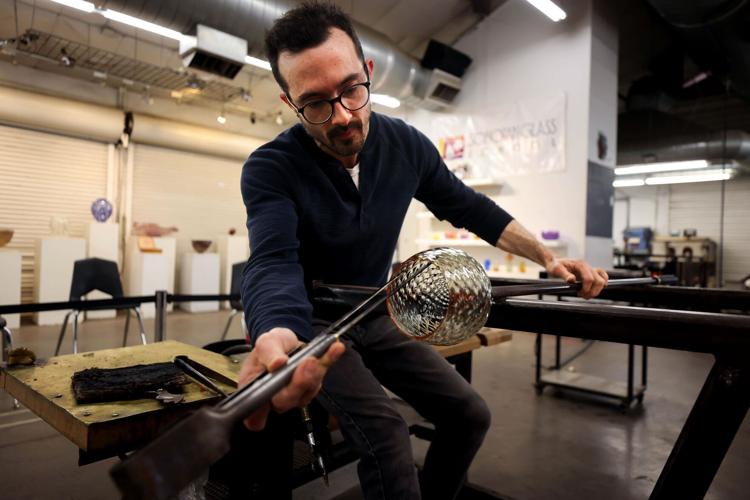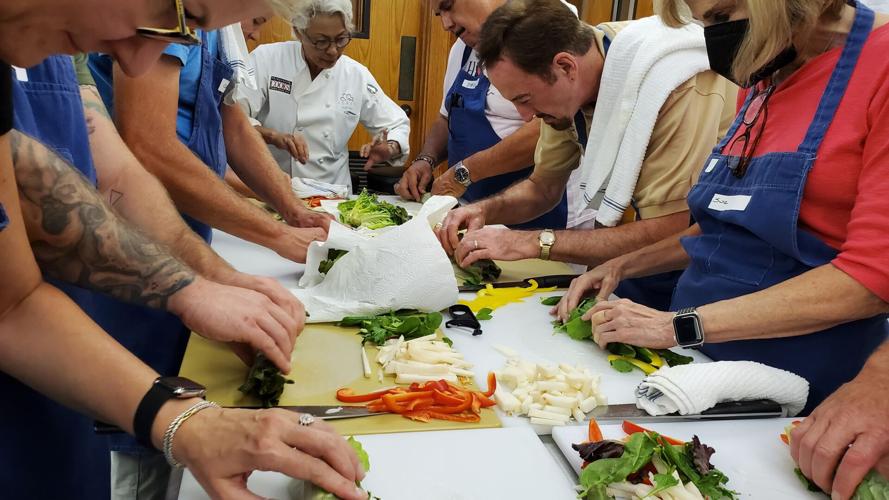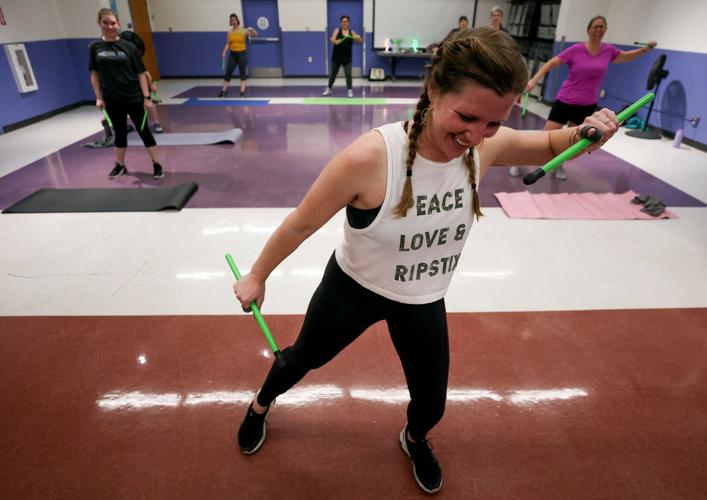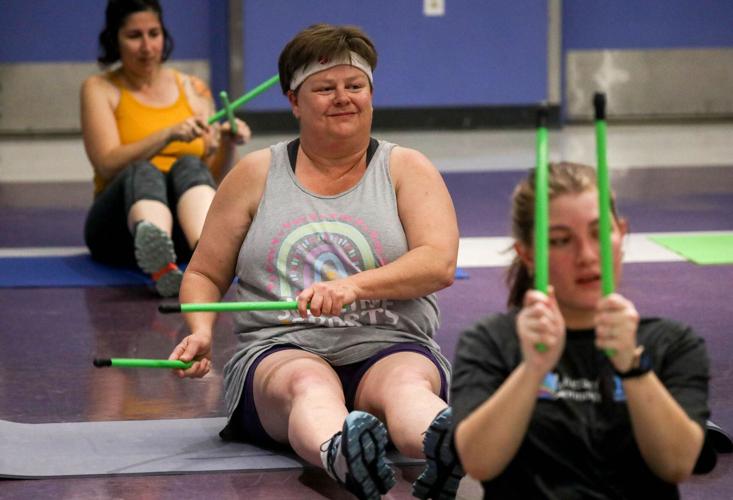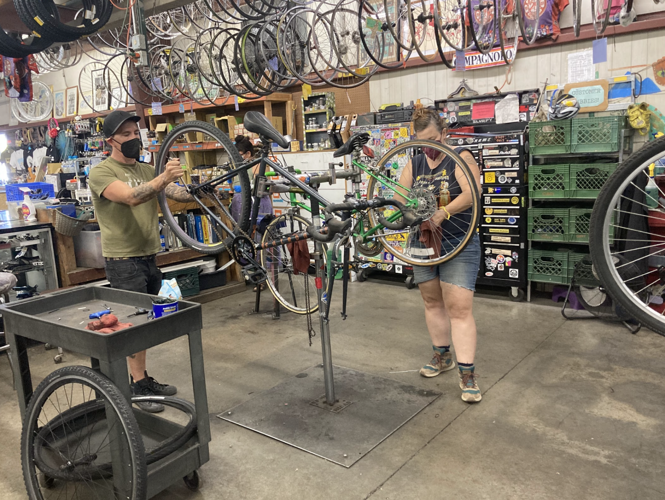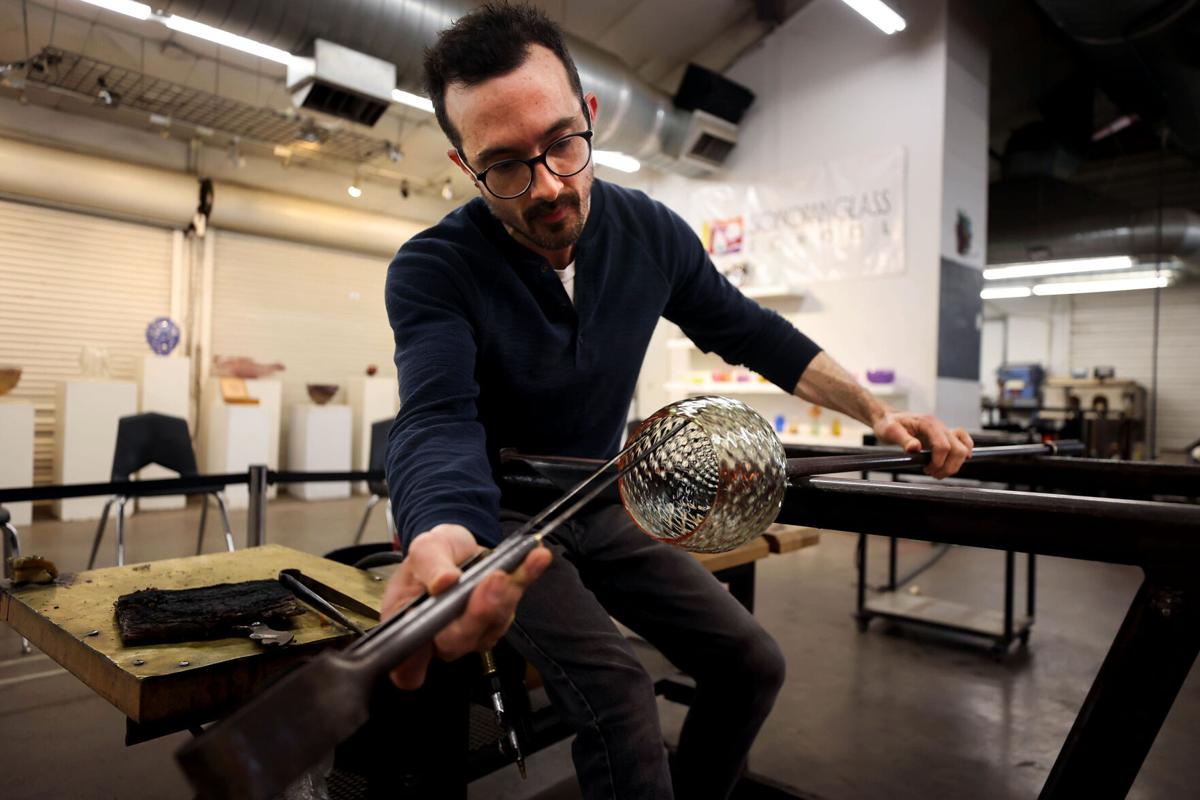Cheryl Bigelow has never considered fitness a hobby. In her off time, she prefers to read, watch movies or hang out with her cat.
But during the summer of 2022, something shifted when she was introduced to Pound Fitness.
“On a personal level, I had a tough couple of years physically and I wanted something that made me feel good about my body and strong,” Bigelow said. “That first class changed everything for me.”
That’s the thing about trying something new, Bigelow says, you never know what it’s going to lead to. It may be a one-off, it may be a new season in your life.
For Bigelow, it turned into becoming a Pound Fitness instructor herself.
A new year opens the door to trying new things. We’ve rounded up a few experiences that could become your new obsession.
Get physical

Cheryl Bigelow, the instructor of the Pound Fitness class offered at Donna R. Liggins Recreation Center, demonstrates moves to her nighttime class on Jan. 31.
It was through Tucson Parks and Recreation that Bigelow first experienced a Pound Fitness class.
The high-intensity interval training fitness program focuses on strength and toning, giving participants — armed with bright green drumsticks — a rock star feel as their sticks clack together up in the air or strike the ground beneath them while high-energy music blares.
The full-body workout is centered around four moves: squats, lunges, crunches and glute bridges. Bigelow says the arm work can get a bit fancy, primarily for the sake of acoustics and to allow participants to rock out.
Because the program allows for modifications, the class is ideal for people of various fitness levels, beginners included.
Months into being a Pound Fitness student herself, in early 2023, Bigelow began transitioning to an instructor, getting certified and testing her new chops on her former coworkers, many of whom have followed her since she began teaching parks and rec classes in August.
Lisa O’Meara is one of those students.
Her first impression: “It was the most fun I’ve had working out, whether it’s in a class or a gym, in a really long time.”
“It’s fun, there’s a little bit of getting aggression out, you know, beating on the floor with those sticks,” she added.
O’Meara said the class has also become a community, which helps drive her to show up when she’d rather go home after a long day of work.
Bigelow’s goal is to expand that community and empower others.
“I had no idea this would become part of my identity,” she said. “I hope people will give it a try, even if they do it just once and feel stronger because of it, I’ve done my job.”
Bigelow’s class is offered at the Donna R. Liggins Recreation Center, 2160 N. Sixth Ave., and at the Morris K. Udall Center, 7200 E. Tanque Verde Road.

Cathi Starr, a Pound Fitness class student, and her classmates practice the movements for the next exercise.
Tucson Parks and Rec offers a number of fitness classes for various ages, fitness levels and abilities. The first spring session is underway, with another slated to start in March.
Some classes that are not considered progressive can be joined anytime during the session. Costs vary based on the length of the classes and materials required.
While they are operated by the City of Tucson, parks and rec classes are also open to those who live in the county.
To learn more, visit tucne.ws/tprclasses.
Get artsy
Glass and fire — two things we’re generally advised to stay away from, or at least be careful around.
Glass art incorporates both of those things for what has been described as a magical, centering experience.
Though mastering glass art takes years, Tucson’s Sonoran Glass School offers several “make your own” experiences suitable for novices looking for an entry.
You can make your own suncatcher, learning to safely cut colored glass into shapes and sizes to fit a design of your own. Students assemble the work and the glass is fused by the experts in a kiln, creating one smooth piece.
For those looking to feel the heat, literally, try your hand at making a making a tumbler. You’ll use a blowpipe to take gathered glass and reheat it in a furnace. You’ll blow air into the blowpipe and use tools to shape the glass. An instructor will guide you along the way and can lend a hand as needed.
Glass fusing experiences, which can also be done for plates and platters, cost $30 to $80. Glass blowing experiences, which include making flowers, paperweights, bowls, vases, ornaments, pumpkins and more, run from $65 to $200.
Tips for first timers: Make your own experience pieces are ready for pickup a week later. Closed-toe shoes should be worn and safety glasses are required (bring your own or borrow a pair).
Despite the precautionary measures, Sonoran Glass School hasn’t had any students suffer serious injuries or burns. As instruction is occurring, the experts assess the student’s ability to follow directions to determine the instructor’s level of assistance.
The school was started in 2001 by Tom Philabaum, a well-known glass artist, and Dave Klein, who sought to educate the public on the wonders, joys and complexities of glass, said Timothy Sweeney, a glass artist and the administrative manager for Sonoran Glass School.
It’s home to a hot shop where the glass blowing takes place, a flame shop for torch work, a warm shop for glass fusing, and a cold shop where you cut, polish, finish and embellish glass.
In addition to serving the public, professional glass artists rent space in the studio, making their own pieces that sell for anywhere from $10,000 to $30,000, Sweeney said.
Sonoran Glass School hosts demonstrations for those just looking to see artists at work, as well as workshops in which artists teach specialty glass techniques.
For those looking for a more in-depth experience, Sonoran Glass School is hosting a semester-long, 20-session class, held twice a week for $1,800.
Sweeney himself is a student of Philabaum’s, taking a semester class with him, leading to a job on Philabaum’s production team for years. It was his background in art, with a Bachelor’s in fine arts in sculpture, that led him to try glass art.
“I took the class, and I, for whatever reason, picked it up like you shouldn’t be able to pick it up and that’s why I was hired,” he said.
Sweeney describes glass art as a cathartic experience.
“For me, and I think what I sense for why a lot of people come in here, is they’re searching for a hobby ... maybe because they’re going through something,” he said. “This environment is extremely cathartic. Glass for whatever reason, in my experience and a lot of people relate to this, it’s a very healing place to be. There’s something about the medium and pursuing this that is very kind of archaic, caveman culture — you’re getting back to your roots, you’re working with everything that’s from the Earth.”
Learn more about the school, 633 W. 18th Street, and view its offerings at sonoranglass.org.
Artist Martin Gerdin visited Tucson's Sonoran Glass School recently and did a public demonstration. The piece he's working on is a glass shark. Video courtesy Sonoran Glass School.
Cook like a pro

Students roll spring rolls during Flying Aprons Tucson’s “Exploring Thai Cuisine” class. The session was taught by Chef Dee Buizer, who owned Senae Thai Bistro in downtown Tucson.
Tucson is a foodie town, what with our award-winning chefs, City of Gastronomy designation, and endless Instagram-worthy eats options.
Michele Schulze, founder of Flying Aprons Tucson, is helping to bring some of that magic into our homes by teaming up with professional local chefs who teach you their techniques and recipes.
Noteworthy names include: Zio Peppe chef-owner Mat Cable, Rocco DiGrazia of Rocco’s Pizza, Carlotta Flores of the El Charro dynasty, James Beard award-winning Janos Wilder and more.
The chefs tailor everything they do for the home cook, says Schulze.
“Juan Almanza, who owns El Rustico, he did a birria class,” she says. “If you went into his restaurant today and had his birria, he’s used like 30 spices in that birria. When he did the class for us, he pared it down and he also showed people how to make birria in a pressure cooker — he doesn’t use a pressure cooker, he does that low and slow cooking, but he was able to adapt what people go to him for for a home version that’s pretty darn delicious.”
In addition to using cooking equipment that’s usually found in a home setting, the chefs work to incorporate spices that are readily available and not too costly, Schulze says.
Schulze’s inspiration to start Flying Aprons goes back to her childhood.
She recalls as a 4-year-old going into a French restaurant with her mother.
“From the time I was pretty young, my mom and I would go out for lunch a lot before I started school,” she says.
On that particular day, a server came to their table and asked how they were enjoying their meal.
“I said ‘please give our compliments to the chef’ with no prompting from my mom. I was very gregarious,” Schulze says.
The server relayed the message to the chef, who couldn’t help but meet the young patron, even giving her a tour of the kitchen.
“That planted a seed, though I didn’t realize it at the time, that this was really a great place to be,” she said.
Though she’s never worked in a restaurant, her background as a journalist and her natural curiosity always led her to wonder about the chefs behind the scenes.
“I thought others may be curious in the same way,” she said.
So she decided to pull back the curtain and bring the chefs and the public together.
She launched just six weeks before COVID lockdowns went into place, devastating the restaurant industry.
From there, she shifted to Zoom classes, which were attended by both locals and people from across the globe in different time zones.
It wasn’t until 2021 that she was able to resume in-person classes, which took things to another level.
One such example: getting to work with Tommy Begay, chef/partner at Sushi on Oracle.
“When a sushi master teaches you how to make a sushi roll and is walking you through it, who puts their hands on your hands if you need help, you’re like ‘I can do this,’” Schulze said.
The menu for each class is different and is decided by the chef, based on what is doable within a two-hour class. Some create recipes specifically for their sessions.
Flying Aprons hosts a monthly series — one on eating well and aging gracefully and another dubbed Behind the Butcher Counter that is meat-centric. There are also classes that accommodate vegans and vegetarians.
The cost of classes vary by the menu, but generally start at $77 per person, which includes the meal that participants get to eat at the end.
“It’s an incredible experience to be in a kitchen with a professional chef,” Schulze says. “The food community in our town is second to none and I feel blessed that all the chefs I have asked have said ‘sure.’ It’s a way for them to get out of the kitchen and meet people who have eaten their food, and for those who are inspired by their food to have some fun for two hours and get some great recipes and make those meals for their friends and families.”
Learn more about Flying Aprons Tucson and upcoming events at flyingapronstucson.com.
Get hands-on

BICAS offers a multi-session bicycle repair course where kids ages 8 to 18 learn bicycle mechanics, practice tangible skills, build self confidence and earn a bike.
Tucson’s reputation for biking has spread far and wide. It’s one thing to ride, but it’s another to be able to maintain your own bicycle.
That’s where Bicas comes in. The nonprofit focuses on affordable bicycle education, teaching community members how to fix a bicycle, build a bicycle, earn a bicycle and even make art from recycled parts.
“It’s really awesome, the sense of feeling autonomous on working on your bike, having an idea of what’s going on systematically and mechanically with your bike,” said Oma Garcia-Thwing, Bicas’ education coordinator.
Bicas’ basic maintenance class is ideal for beginners, Garcia-Thwing says. In this three-hour class, you’ll go over patching tubes, adjusting brakes and shifters, diagnosing problems, safety checks and more. If you don’t have your own bike to bring with you, one can be provided. The cost is based on a sliding scale, ranging from $10 to $36.
Garcia-Thwing says it’s not uncommon for people to take advantage of Bicas courses before they even have a bike to get a better understanding of that mode of transportation before becoming an owner. There are also those who simply like to tinker around in a shop.
The ultimate tinker class is the build-a-bike course, which is five four-hour sessions. For anywhere from $50 to $200 (based on a sliding scale), Bicas takes bikes off the floor, and students learn to dis- and re-assemble it entirely. You’ll learn to rebuild bearing systems, replace cables and housing for brakes and shifters, install chains and more.
Participants don’t get to take the bikes home, but they do get a comprehensive understanding of what makes a bike roll, turn and stop.
While the class is intended for ages 16 and up, there’s also a youth earn-a-bike class, which teaches kids ages 8 to 18 bicycle mechanics, problem-solving skills, self-confidence, environmental awareness and more. The best part, as the name implies: They get to take the bike home, along with a helmet and lock. The sliding scale fee is $25 to $200.
Bicas offers two clinics, one for gears, one for brakes, at a cost of $10 to $36 each.
For mountain bikers, there’s a three-hour class that focuses on modern mountain bike technologies. The cost is also $10 to $36.
Last year, Bicas served about 120 people in its adult classes and nearly 50 youth.
Once classes are complete, Bicas is still around to provide support through its community tools program, where you can access tools, repair stands and help from mechanics for a small hourly fee.

BICAS’ community tools program provides access to bicycle tools, repair stands and mechanical assistance for a small hourly fee.
The organization offers work trade, allowing people to work in the shop (at 2001 N. Seventh Ave.), earning $16 an hour in credit that can be used for class fees.
“Our goal is to have people feel empowered to work on their bikes themselves,” Garcia-Thwing said. “We’re there to get them started and answer questions along the way, but we want people to feel confident in doing repairs themselves.”
A tip from Garcia-Thwing, the shop gets pretty cold in the winter and pretty hot in the summer, so dress accordingly. Masks are also required.
To learn more, visit bicas.org or email education@bicas.org.
There’s always more
We’ve shared a few hobby possibilities, but the options are endless. Here are a few more ideas.
The Pima County Public Library offers a number of free resources to learn a new language, including Korean, Chinese, Spanish, Japanese and more. There are online and in-person courses for English-language learners, too.
Visit library.pima.gov/languages for a list of online programming. For in-person classes, see the library calendar at tucne.ws/1par.
If you don’t have a library card, don’t worry; you can get one online through library.pima.gov/getalibrarycard.
Language learning programs aren’t the only things you can access for free through the library.
Hobbies & Crafts Source contains thousands of articles from top hobby and craft magazines and books, as well as recipes, how-to videos and hobby profiles. Check out the MakerSpace Spotlight for step-by-step projects that promote hands-on learning and creativity. Find it at tucne.ws/1pas.
If you’d like to be more handy around the house, check out Home Improvement Source for thousands of articles from leading home improvement magazines and reference books, plus a collection of home repair images. Quickly find the information you need by searching by keyword or browsing projects from A-to-Z or by category. Learn more at tucne.ws/1pat.
The library also offers its own programs related to arts, crafts and hobbies, including jewelry making, crocheting and knitting, collage art and drawing. View the calendar at tucne.ws/1pau.
If you’d like to develop a green thumb, a great starting point is the Pima County Master Gardeners. They have classes for beginners.
The University of Arizona-trained volunteers serve as community educators, providing research-based information on environmentally-responsible gardening and landscaping, according to their website.
They also offer free plant clinics to answer plant and gardening questions by phone, walk-in or email.
Learn more and get information on upcoming classes at extension.arizona.edu/pima-master-gardeners.


